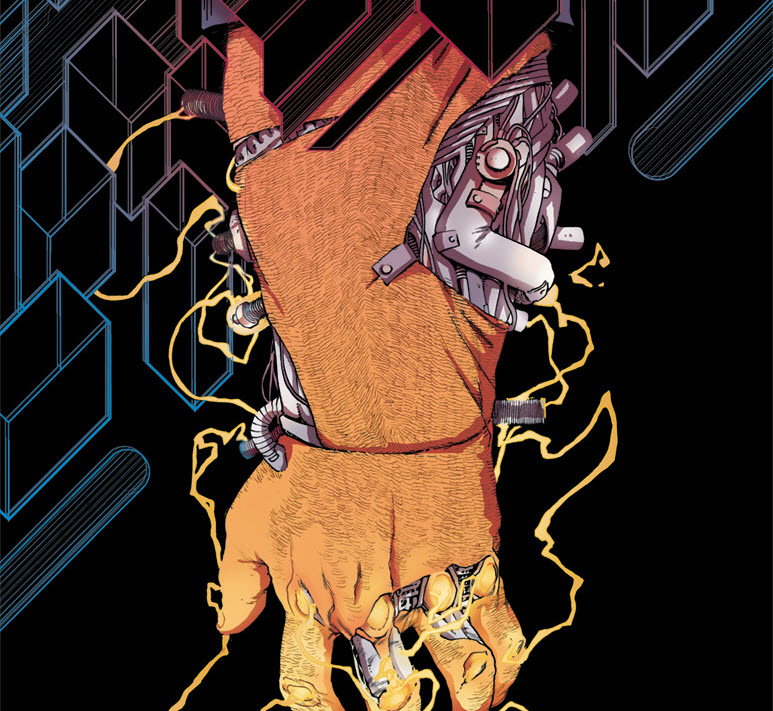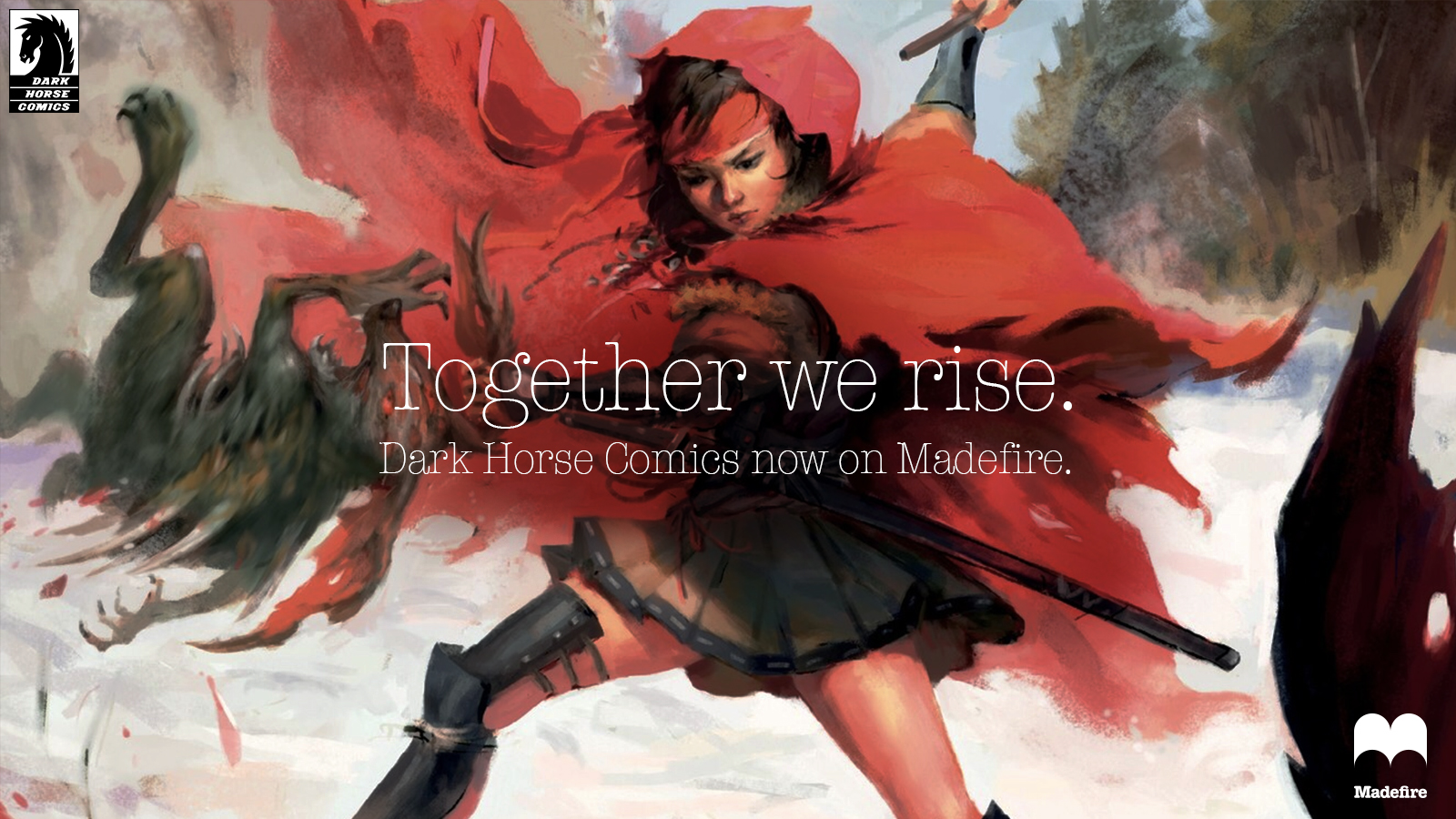Brian Hibbs has another retail-focused take on digital which begins:
I had kind of hoped I was done talking about digital, for at least a little while, but I think there are still bits that people are confused enough about that staying on the topic for another month might make some sense.
Bad news, Brian: we are going to be talking about digital for the rest of our lives, just like we talk about TV, movies and Brussels sprouts. Get used to it.









You linked to Brian’s column just to take a rimshot? Isn’t that what his CBR forum is for?
Hey, I was against it at first too, but now it’s only a matter of this weekend before our first issue of Moonlight Art Magazine becomes available for i Pad. You know what? We’re really excited about it.
I’m seeing a future where more people are able to read comics on their phones and pads then visit their ‘Comic Trade Shop” to pick up the collection in print.
That sort of system has worked very well in Japan. A tiered system where the more devoted fan buys the more expensive version of the story.
Brian’s idea that there won’t be advertising in digital comics is of course, ludicrous. We will not only see more advertising, but will see direct advertising to individual readers. My comics on Ipad will have the same story as yours, but my ads will be slightly different to cater to my tastes.
Loads of books and comics are available with ads through WOWIO. They are called sponsored downloads on that site.
I like the essays that Brian writes about comics and comic book retailing. But there is a difference between doing neutral analysis and doing a house ad for the Direct Market. He makes interesting points even after factoring in the bias.
I LOVE Brussels sprouts.
One should never venture out into the CBR forums. Or any comic forums if it is at all avoidable.
It is far too dangerous.
One advantage of digital, as a retailer, is that people who publish books that nobody wants will only be able to blame themselves. No more pointing the finger at us retailers who stocked the book but could not sell it.
Karen’s right. Steam them and sprinkle some garlic salt, oh mama… there’s good eatin’.
Personally I don’t care if people read comics in print, digitally or tattooed on the backs of illegal immigrants, but the Beat’s cheerleading on the subject has become shrill and tiresome.
“Brian’s idea that there won’t be advertising in digital comics is of course, ludicrous. ”
Just to be clear(er): I wasn’t trying to say there *couldn’t* be advertising through digital, just that the current model of advertising (where Marvel and DC sell print ads across “families” of books) isn’t going to be exactly replicated, and, so, for the purposes of financial calculations, those amounts are “lost”.
Without the current ad revenue, that will be several hundred/thousand more downloads that would have to be made, in the current model as it exists at this second.
-B
Oh, I’m sure somebody somewhere will blame someone else for why their book didn’t sell as much as they thought it should. THAT will never change.
The funny part for me is how Brian guesses at how iTunes pricing and Comixology pricing on the fly. I mean, I guess it’s good in a way because it means he’s too busy running his store to keep up on how other companies are operating. I mean, Hibbs seems like a guy who truly loves both comics and selling comics, just not someone who can talk with authority on digital comics.
THIS JUST IN – Brick and mortar retailer doesn’t think highly of digital distribution.
More at 11.
Brian does make some good points about the fact that the Big Two literally can’t afford to undermine the current more reliable and lucrative Direct Market. The music industry and brick-and-mortar record stores are a good (if not exact) analogy. Legal digital downloads of music have increased greatly over the past 10 years but overall sales of CDs, singles, etc., have fallen by 50% in that same time and record stores went out of business. Millions of 99 cent downloads are still not enough to make up for sales of the actual physical CD.
I’m not under any illusion that digital download of comics is coming but I think Brian’s words of caution are persuasive.
“THIS JUST IN – Brick and mortar retailer doesn’t think highly of digital distribution.”
I know Snark is the lingua franca of the internet, but if you think that’s EVEN CLOSE to what I’m saying, you really need to read the article (and the one before it) a few more times…
-B
brian, please please please don’t make me read your article one more time.
if your work requires multiple readings, as you are suggesting (as if you are the James Joyce of the blogosphere), then why not try writing in a clearer, more understandable way?
and for YOU to put some one down for using snark is the height of hypocrisy!!!
I like digital comics, I do.
But here’s the really stupid thing. Like totally counter-intuitive and ridiculous:
I have recently become a monthly comic book reader. After ten years of not following monthly-scheduled comics, I’ve become the person who likes them more than anything.
Will that change once I upgrade from an iPhone for my digital needs to an iPad? Possibly. But for my money ($500+tax+digital data plan), I have a blast reading my pamphlets on the subway, leaning against the door. MAYBE IT’S ME. It’s like the easier that new technology becomes to operate and navigate, the more I (personally, I remind you) seem to plummet toward ancient technology.
Go.
Figure.
The discussions about digital comics are not necessarily an argument about the comic market of today. It’s an argument about the market of tomorrow.
Where the DM is flat, e-comics are booming. The superhero publishers are writing for their aging fanbase with the precision of a sniper. For many titles, it’s not working.
Instant distribution levels that playing field and expands opportunities for artists outside of the mainstream. E-comics attract a new kind of fans to the medium.
There should be a sustained attempt to keep the DM intact and functional. Some think that trumps every other possible choice.
With a singular focus, you risk losing either today or tomorrow.
So… if customers can get their comics for free or cheap, they might not visit the local comics shop?
Well, hate to tell you this, but this sort of thing has been going on in PRINT comics for over ten years.
Libraries have been stocking and pushing graphic novels ever since Pokemon hit the scene. They have circulation figures. They have teen patrons as advisors on what series to acquire. They actively promote graphic novels as a way to lure “reluctant readers” to read. They host reading groups, and some even participate in Free Comic Book Day.
And… Diamond actively courts this market, publishing special newsletters and websites.
Now… do these readers visit comics shops and buy comics and trades and other stuff? How do you measure this? How do you measure sales from digital comics? How do you measure guys like me, who migrated from newsstands way back in the 1980s?
What digital comics does promise is this: greater participation and community. Companies can get instant feedback. Entrepreneurs can see what is read and where fans are, and exploit that. Fans can be encouraged, and that’s important.
Because, if there are no new fans, where will all the snark come from?
@darralayo
Huh, I’m exactly the opposite of you. As soon as I started using a Kindle, I lost all use for paper books. (The iPhone Kindle app is amazing for functionality.) Some books I *have* to read in paper because they’re not available as e-books yet, but I have no desire to ever go back. Comics on the iPad feel like it’s how comics were meant to be made.
Technical question from someone who’s never used an e-reader:
Was flipping through this week’s New Avengers and wondered how an e-reader would handle this page: http://www.comixology.com/previews/APR100555/7/ For one, it’s a double-page splash (even the Comixology preview doesn’t show both pages side-by-side), and then there’s the superimposed Luke Cage in the foreground, so I think a panel-by-panel viewing would fall apart. At some point you’d have a panel of people talking with Luke Cage’s legs inexplicably crowding them out :D
But panel-by-panel probably isn’t the norm, right?
Brian, this is an argument a comic retailer is never going to “win.”
Somehow it’s simply easier to paint comic retailers as the bad guys in all this. It’s like we’re taking money out of their pockets by selling them the stuff they want. How dare we!
Just keep in mind that in reality it’s a fairly small number of people making all the noise on digital and they probably weren’t buying many comics from us anyway. They’re more worried about where they’re going to store all the paper (but I do sell a hell of lot of comic supplies, so somebody must be buying paper).
I guess all those folks I saw at the recent comic convention I attended, or all the fans that turned out for HEROCON, or the record crowds that NYCC has been producing each year, they’ll all be switching to digital readers soon and running around artist alley getting their iPads signed.
When I look at my customer base I don’t see a heck of a lot of my customers moving to digital. And in fact, most of them have expressly told me that they had no plans to do so, and that if they were ever “forced” to, that is that physical comic books went away, they might pass on it all.
I can understand the appeal digital has to some folks, and I can understand their enthusiasm, but I think they way over estimate the actual impact.
What ever, I still plan on opening the store tomorrow….
My turn to snarly.
Dan Veltre
Dewey’s Comic City
Madison, NJ
@Dave
It depends on the reader. Most show a 2 page splash page as one page. I don’t know how they’d do a 4 page splash. Some readers offer the option to zoom in and out, too.
The cool thing for me is we’re no longer limited by the page. Like on an iPad, we’ll either have pages that are super long or super tall and you can scroll along and read them. Or, you can flip the iPad around to read the pages differently.
Here’s the intro to our first iPad addition of Moonlight Art Magazine. Take it for what it is.
When I first heard about electronic readers, I was appalled. For the longest time it seemed to me that as soon as there was media available over the web, there were people all too eager to declare print “deseased”, and here was what seemed like another step in that direction. Being a lover of books (bibliophile) I became worried, maybe even a little paranoid about the potential destruction of not only print, but a great span of our future history. I imagined archeologists digging up vast expanses of cracked and shattered computer screens without the slightest clue as to what they might have held. I saw enthusiastic book burnings while people shouted that print was as dead as disco, only to wake up the next day to find that a computer virus had wiped out the entire works of Orwell, Bradbury, and Alan Moore. My beloveds would have to go into hiding if they were to survive at all.
Then something happened that I didn’t expect. The people who were being introduced to great works through iPads, Kindles, and Nooks, wanted hard copies of the works that truly touched them. It was not the end of print after all, but the discovery of literature though a new system of delivery, and that system is available for anyone to publish through or read from. That means we here at Moonlight AM get the best of both worlds. We bring you the magazine, and we get to stay in print. No, really! Go to http://www.moonlightartmagazine.com and you’ll see. Even more exciting is its potential. Like music, comic books, theater, movies, or books, it has the potential of becoming its own language. Who knows what a person might be able to say with an app, in the near future.
And so, I’ve had a change of heart and decided to bring you Moonlight Art Magazine on the e (or I) screen. We enjoy doing our magazine and we want you to enjoy it, too. Why? Because we’re excited for art. The interviews, comics, and articles (yes even the one about Kindle) are done first and foremost out of love. We are in love and we want you to be in love, along with us. No matter what format that feeling comes through on, we want you to feel our passion as we do. Can I say it another way? Can I ever feel satisfied that you’ll truly understand? If you do, then it doesn’t matter how we get to you. It just matters that we do.
-Christopher Moonlight
06/17/2010
Retailers, please stop telling me I don’t want digital comics. I do.
I started reading superhero comics again when I got my iPad. Granted, I’m buying old (gore and misogyny free) Marvel stuff and not new stuff, but a sale is a sale and a fan is a fan. Back after 15 years.
I know several other iPad owners who’ve bought comics via the Marvel Ap who are flat out not comic fans, because digitally colored comics look GREAT on the iPad.
My sense is its already creating new fans, and once there’s a (slightly) less expensive Andriod powered tablet, I think digital comics are going to explode.
One way to keep the retailers involved in the digital distribution chain is for publishers to allow them to sell the monthly digital comic releases in special editions, with value-added content: sketch variants, video clip interviews.
Not available through other channels.
Hmm, seems I was anonymous there, needed to reset my name.. anyway. Like “I” said…
When I look at my customer base I don’t see a heck of a lot of my customers moving to digital.
That’s odd, because if anything defines “Forward-looking” it’s the direct market’s still massive customer base.
Awesome!!! Since all retailers don’t seem to think their customers will move to digital and they won’t be hurt by it, then there is no reason not to release digital comics on same day and date as comic shops. Hop to it Marvel and DC! Your brilliant direst market retailers won’t feel any impact!
“That’s odd, because if anything defines “Forward-looking” it’s the direct market’s still massive customer base.”
So William (and I guess Big, too) am I understanding you correctly in saying that the customers who are currently actually buying comics are not to be considered or that their opinions not important? That you are more more in touch with the reading demands of comic book fans than those that actually buy comics?. REALLY?
Dan Veltre
Dewey’s Comic City
Madison, NJ